This article draws upon the extensive dataset from our latest Index report, analyzing 159,000 EcoVadis sustainability ratings from 2020 to 2024 to highlight key performance trends among UK companies.
Sustainability is a critical component of business resilience and growth in the modern UK landscape. As regulations evolve and stakeholder expectations rise, companies are increasingly recognizing the imperative to understand and improve their environmental, social, ethical and governance performance.
At EcoVadis, we're seeing this commitment firsthand. A rapidly growing number of UK companies are leveraging our ratings and platform to evaluate their sustainability performance. Between 2020 and 2024, over 5,000 UK businesses, spanning various sizes and industries, underwent at least one assessment. The nearly 3,000 country assessments conducted in 2024 alone represent a 34% increase from the previous year, accounting for 6% of total ratings across our global network and almost 11% of total ratings across Europe.
Figure 1: Countries with the most assessments (2024): first-time ratings vs. 2+ assessments
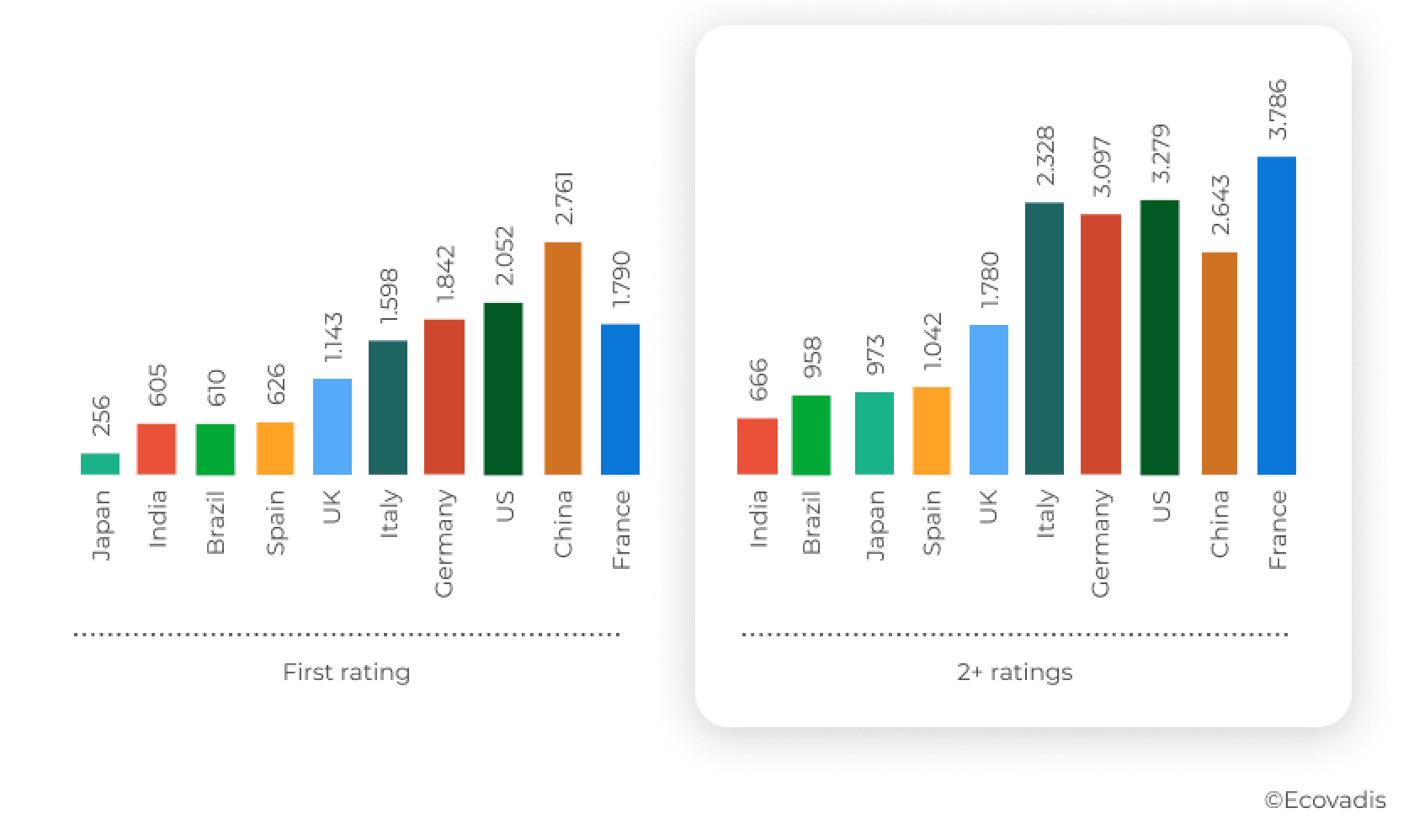
Roughly 2,500 of these were small (25-99 employees) and medium-sized (100-999) enterprises (SMEs), while large companies (1,000+ employees) made up the remainder. This impressive growth was fueled by over 1,100 newcomers to the network and more than 2,500 reassessed companies. A quarter of all UK companies that engaged in the assessment process in 2024 were doing so for at least their third time.
Whether first-time-rated or seasoned veterans of the process, most are either small or medium-sized – a crushing majority (84%, up from 78% in 2020) of the companies comprising the UK network are SMEs.
Company size is a factor
UK companies continue to make headway on sustainability, with their overall average score rising from 53.9 points in 2020 to 58.7 in 2024 – a notable increase of 4.8 points. This score falls firmly within the "Good" threshold of the EcoVadis 0-100 performance scale, positioning the UK in sixth place globally, between Belgium (58.8) and the Netherlands (58.3). This indicates that the typical UK company has significantly reduced its operational sustainability risks and has a management system in place that addresses high-level environmental, social and governance challenges.
An EcoVadis overall score is determined by a company’s performance on 21 key criteria and numerous subcriteria, spanning four sustainability themes: Environment, Labor & Human Rights, Ethics and Sustainable Procurement.
Despite gaining 5.5 points since 2020 overall and reaching an overall score of 56.2, large companies in the UK are trailing behind their smaller peers (59.1). (Small companies have gained 4.7 points over the past five years, while medium-sized companies have gained 4.0.) This disparity reveals a key distinction in how different-sized companies are driving sustainability. The bulk of the progress made by large companies since 2020 is driven by their average scores on Environment (+8.0) and Sustainable Procurement (+6.4). This strong performance in supply chain sustainability is likely a direct result of their greater capacity and market pressure to engage their numerous suppliers on crucial ESG topics.
Conversely, the edge held by SMEs can be largely attributed to their performance in Labor & Human Rights (+5.4) and Ethics (+3.6). This growth is a strong indicator that smaller organizations are actively responding to increasing market and client pressures related to human rights and ethical practices.
Figure 2: Average scores by company size in the UK (2024)
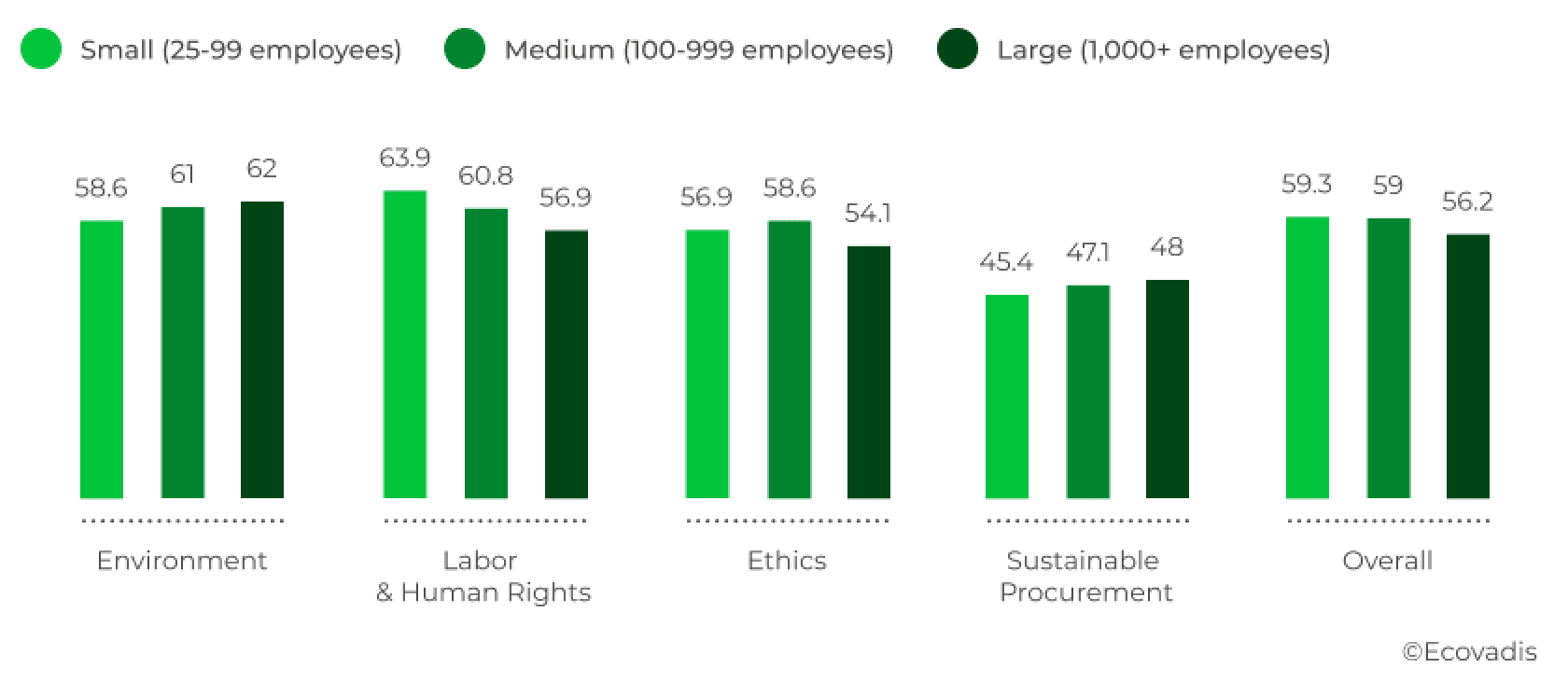
Supply chain sustainability: A key lever for improvement
While smaller UK companies are keeping pace with top-performing SMEs in Europe, with their average score being just 0.1 shy of small companies in Finland (59.4), the leading country in the overall performance ranking, their large peers are falling well behind companies in Europe, especially in Sustainable Procurement.
A deeper look at the performance of the UK's three largest trading partners – Germany, France, and the Netherlands – highlights this growing gap. While the UK was once on a similar trajectory to Germany, Germany's performance has surged since 2023, coinciding with the introduction of its Supply Chain Due Diligence Act (LKSG). This has allowed German companies to not only catch up but also outpace UK performance.
Figure 3: Sustainable Procurement scores of companies of all sizes (2024), for comparison
Visit our Index Online to toggle between years and different views
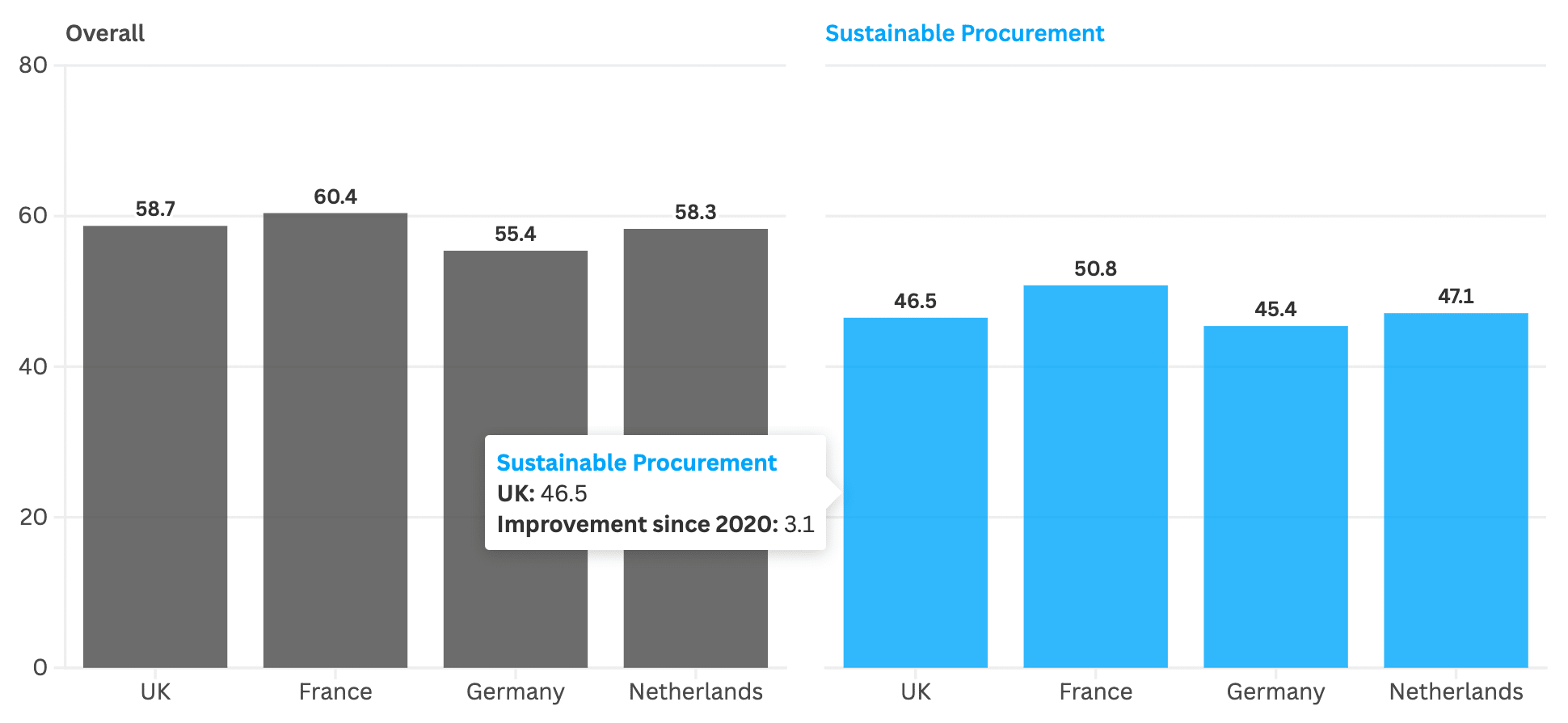
This trend is reflected in the proportion of companies at a higher risk level. A significant 18% of large UK companies score at the "Partial" level or below (<45 points), indicating an underdeveloped sustainability management system. This compares to just 7% of peers in France and 9% in Sweden, and, by contrast, no large companies in Finland are below this threshold. While about a quarter (24%) of large UK companies have successfully reached the "Advanced" or "Outstanding" performance category (65+ points) – a significant improvement since 2020 – the data shows that this progress is not enough to keep pace with the advancement of their European counterparts.
With key trading partners already acting on regulatory pressure, large UK companies cannot afford to wait. The data signals a clear and urgent need to focus on advancing Sustainable Procurement now to remain competitive and mitigate future risks.
Figure 4: Performance distribution of large companies in the UK, compared to peers (2024)
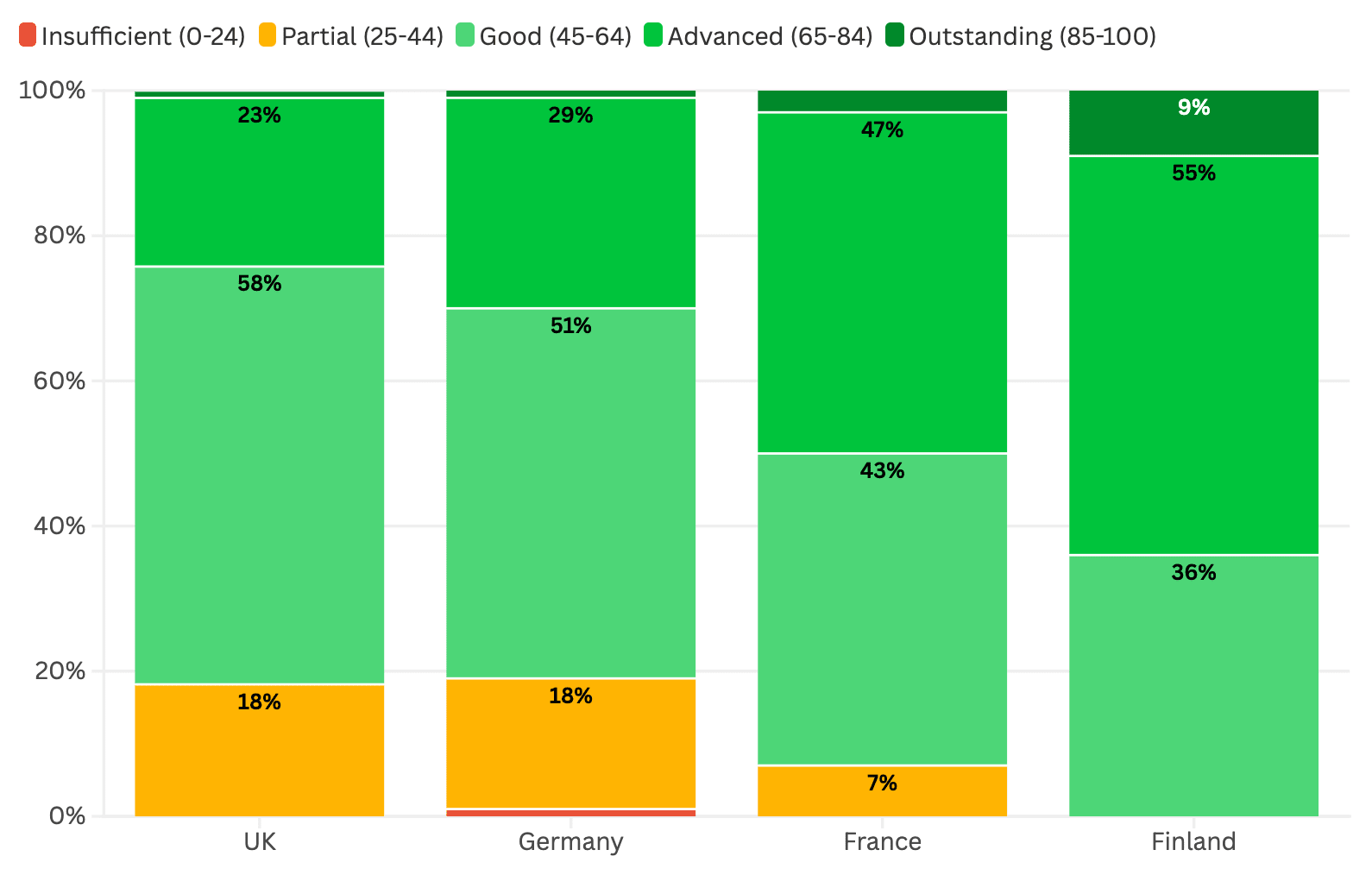
UK companies continue to rank first on Ethics performance
In terms of average scoring in 2024, UK companies in the EcoVadis network are performing best on Labor & Human Rights with an average score of 61.5. They impressively rank first worldwide in Ethics performance with an average score of 57.2. Through this theme, EcoVadis assesses how effectively a company addresses issues of corruption, anti-competitive practices and responsible data management.
Ethics has traditionally been a strong suit for UK companies, placing them among the leaders since we began tracking performance. However, this position may be at risk, as progression has stalled significantly over the past five years (+1.0), with a dip of -0.8 between 2021 and 2022. Additionally, medium-sized and large companies have seen marginal drops in their averages over the last year. While a similar slowdown was observed in Norway, other top-five countries on Ethics have improved over the same period, particularly Greece, which made significant gains across all company sizes (+10.1).
Engagement and improvement: The role of first-time vs. multi-rated companies
An influx of companies with less maturity in this area causes part of this slowdown. In 2024, 46% of companies with only one assessment were newcomers, with the majority being small and medium-sized enterprises (SMEs). This is reflected in the performance of large companies assessed for the first time in 2024, which scored just 48.7 points. This score, although above the high-to-medium risk range, is nearly 7 points lower than the average for first-time newcomer SMEs, indicating that they have more work to do to integrate sustainability best practices. This performance gap narrows to just 3.2 points among companies rated twice or more, showing the value of a continuous improvement cycle.
As a general trend, SMEs with one assessment typically score higher than their larger counterparts, especially in Labor & Human Rights (8.8 points) and Ethics (6.9 points). Upon reassessment, SMEs continue to score better overall by 3.2 points and continue to lead in these two themes, with the score gap narrowing to 5 points for Labor & Human Rights and 4 for Ethics.
Figure 5: SMEs and large companies – scoring difference between first-time rated and companies with multiple assessments (2020-2024)
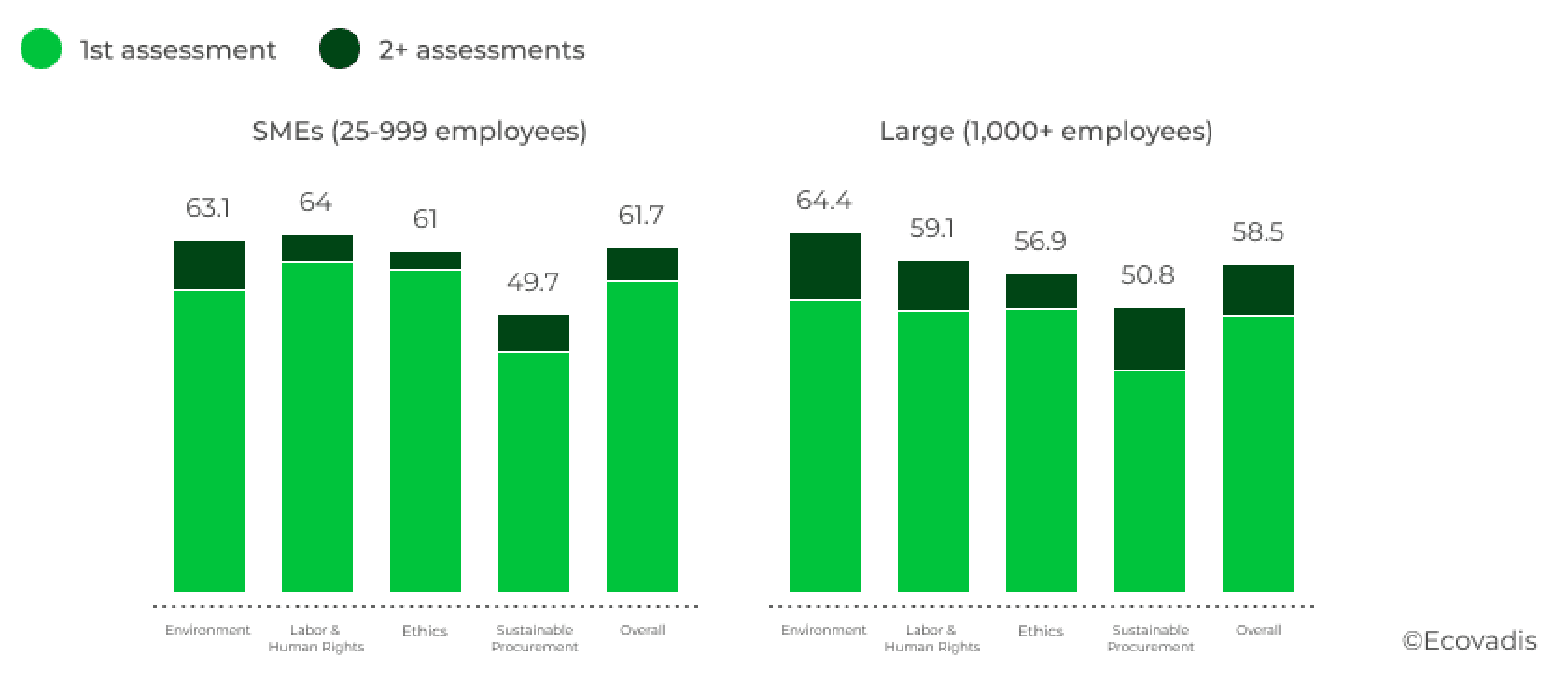
This dedication to continuous improvement is paying off. Across all company sizes, 92% of UK companies are now performing at a “Good” level or above (45+), which is slightly better than Europe's 89%. Of the 348 companies assessed in 2020 and then again in 2024, over one-third progressed at least one performance level. Consequently, the number of companies in this committed group performing at an “Advanced” level and distinguishing themselves as leaders nearly tripled from 14% to 41%, illustrating the significant impact of multiple cycles of benchmarking and improvement.
Figure 6: Performance distribution of companies assessed in 2020 and then again in 2024
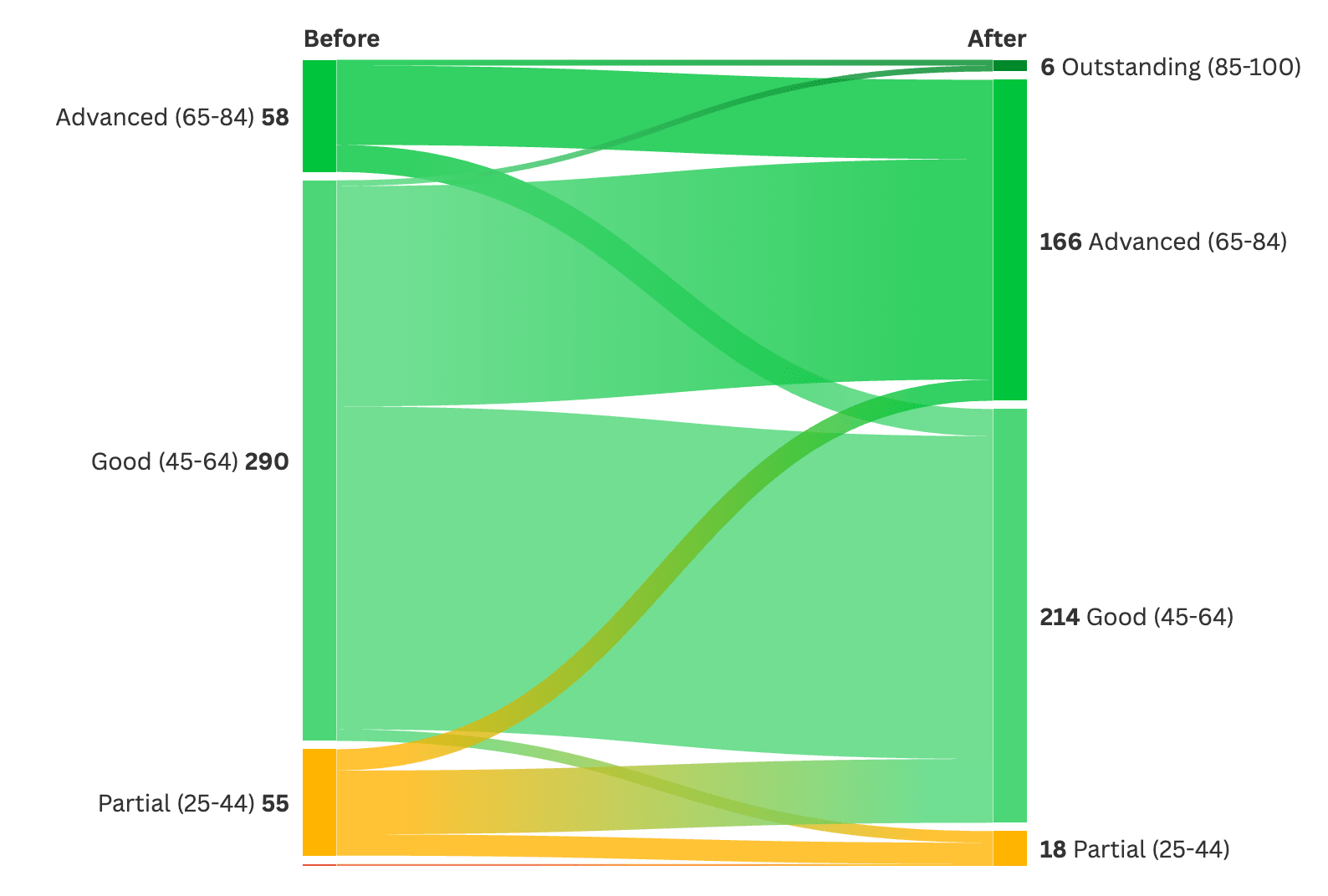
The EcoVadis network effect
The data above shows performance, but it's equally important to understand the dynamic network that drives sustainability forward. EcoVadis isn't just about individual company scores; it's about fostering collaborative improvement across global supply chains.
The invitation to undergo our assessment usually comes from a strategic partner (“requesting” or “buyer,” as opposed to “rated” or “supplier”). Once this link is established and a sustainability scorecard is published, results can be shared further with other companies in the EcoVadis network, creating a unique web of connections.
In 2024, there have been a total of 15,800 active links connecting to UK companies, including 3,400 links drawn just this year, demonstrating the platform’s active and expanding role. The majority of these UK-related links are international: 15% are domestic and 85% are outside the UK. Of these external links, 61% are with companies in Europe, while the remainder are connections outside the region.
Within international links, 44% see the UK company as a supplier, and 56% see it as the “requesting” side, highlighting that UK businesses are actively engaged in both roles of key patterns in global value chains and increasingly responsible buyers.
Figure 7: The percentage of network links involving the UK per other country (2024)
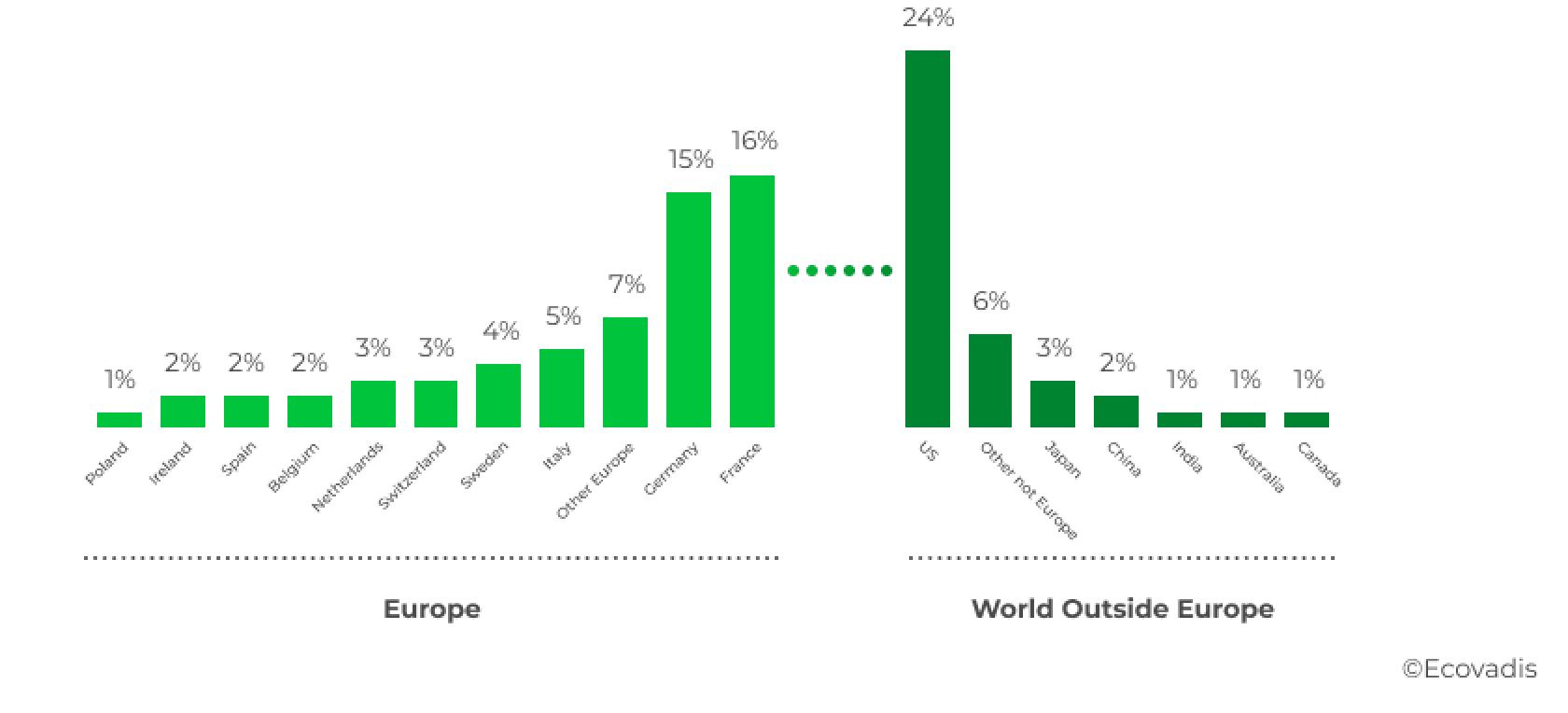
This deep integration into global and regional supply chains underscores the increasing need for UK companies to manage sustainability risks and opportunities beyond their own four walls. For UK companies acting as suppliers, these connections represent significant business opportunities, with a total of over 5,300 links deployed on almost 2,000 unique companies. UK companies, as requesting businesses, reached over 120 unique businesses, indicating a strong drive to evaluate and improve their supplier base.
Ready to elevate your company’s sustainability performance and strengthen your position in the global value chain? Start or accelerate your sustainability journey today.
About the Author
Follow on Twitter Follow on Linkedin Visit Website More Content by EcoVadis EN





















